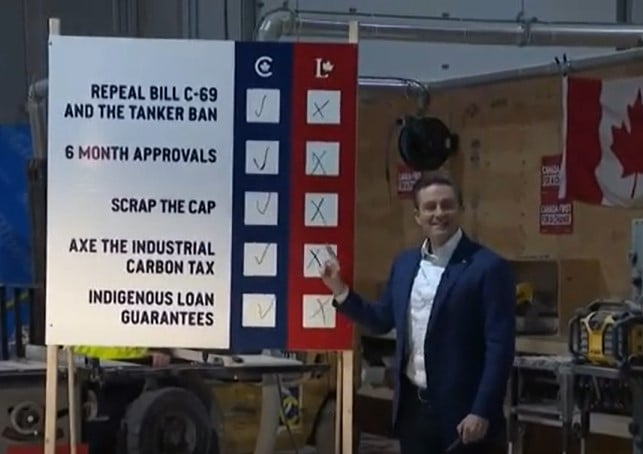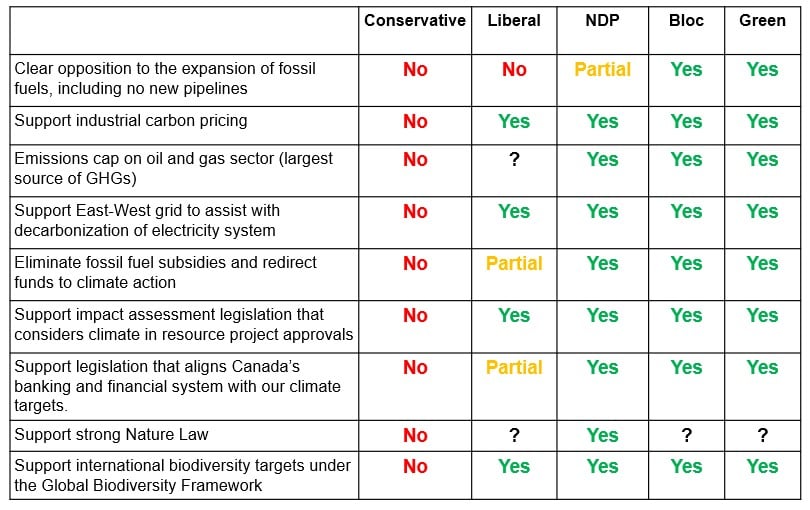TORONTO – RBC’s new corporate commitment to drop clients who lack an adequate net zero transition plan means the bank should stop financing Canada’s biggest oil sands companies, according to a report from Greenpeace Canada. Greenpeace is calling on RBC to drop oil companies like Suncor, Cenovus and CNRL whose net zero transition policies don’t meet the criteria set by the International Energy Agency to evaluate corporate action on climate. Greenpeace is also calling on the federal government to use the IEA criteria as the basis for new rules on climate finance.
“RBC is clearly feeling the heat from Indigenous, environmental and investor organizations to phase out fossil fuel financing, respect Free Prior and Informed Consent and ramp up investments in climate solutions,” said Keith Stewart, senior energy strategist with Greenpeace Canada and author of Walking the Talk: Why RBC is obligated to stop funding some of its biggest oil company clients. “If RBC’s new climate financing policy is to be treated as more than greenwash, they need to stop funding oil companies whose transition plans fail the test set by the International Energy Agency.”
As the largest funder of fossil fuels in Canada and the fifth largest in the world, RBC has come under increasing pressure to phase out its funding of oil, gas and coal projects that fuel climate change, destroy biodiversity and violate the rights of Indigenous peoples. After years of saying it will engage with companies rather than divest, RBC announced in its November 2023 Client Engagement Approach on Climate that it “is prepared to make difficult business decisions and ultimately step away if a client, after repeated engagement, does not demonstrate sufficient planning for the energy transition.”
A few days after RBC posted their new policy on their website, the International Energy Agency released its November 2023 The Oil and Gas Industry in Net Zero Transitions report that establishes authoritative criteria for determining whether oil and gas companies are, in fact, demonstrating sufficient planning for the energy transition.
Greenpeace’s Walking the Talk report applies the IEA’s criteria to three large oil sands producers (Cenovus, CNRL and Suncor) because they are amongst RBC’s largest fossil fuel clients, have a long history of investor engagement on climate and have net zero commitments. The report finds that these companies do not come close to meeting the IEA’s criteria for alignment with the IEA Net Zero scenario as they all have:
- A commitment to investing in new fossil fuel projects. Companies aligned with the IEA net zero scenario shouldn’t invest in new long-term fossil fuel projects.
- Earmarked less than 20 percent of their capital budget for clean energy. The IEA says it should be over 50 percent.
- 2030 GHG reduction targets in the 15-30 percent range. The IEA says it should be over 60 percent.
“We need to get big money out of fossil fuels and into climate solutions if we are to have a chance of solving the climate and biodiversity crises,” said Stewart. “It is time for RBC to finally ‘walk the talk’ on their climate commitments, and stop funding oil and gas companies without credible net zero transition plans.”
ENDS
Note to editors:
RBC published its most recent Climate Report on March 6, 2024. In it, RBC acknowledges that it doesn’t see a way for its oil and gas clients to align with a 1.5ºC target and has therefore established a lower standard for them. On page 13, RBC states: “Many of our clients in high-emitting, hard-to-abate sectors, do not have 1.5ºC aligned emissions reduction targets. This challenge is particularly significant for the oil & gas sector where clients do not typically have a clear path to achieving the magnitude and speed of reductions implied by such targets. At the same time, we believe there is a need to help our clients to decarbonize their production today and explore new growth opportunities in low-carbon energy. Therefore, our eligibility criteria for decarbonization activities can be based on an assessment of the client’s transition plan, and can still be considered eligible without 1.5ºC aligned emission reduction targets.”
For more information, please contact:
Keith Stewart, senior energy strategist, Greenpeace Canada
[email protected]; +1 416 659-0294



